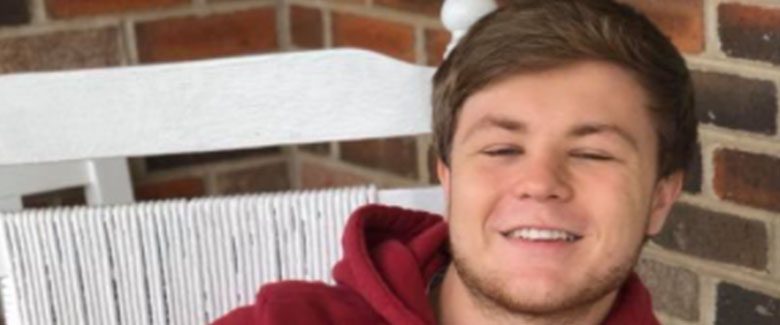
Robert Dillon Fields, EKU psychology major
I stumbled upon a class I hadn’t heard of during the registration process. It was called “VTS 200 Introduction to Veterans Studies.” At first glance, I was interested because I knew it would fit well with my psychology major. My goal is to become a substance abuse counselor, and I knew before joining this class that understanding veterans and their unique experiences would help me serve that population better. I thought the class could make me better at my job.
During the first week, I realized that this class was going to be different. For example, Dr. Martin, our instructor, said he was going to let us propose our midterm and final grades. He said, “I want you to find what intrinsically motivates you to learn about veterans and follow that passion.” It made me push myself harder knowing I would have more control over how and what I learned. I felt I could put my full effort into the class not worrying so much about getting perfect grades. Instead, I used my best judgment to decide how the class would unfold for me personally.
Still, I will admit that the Oral History Project worried me at first. The first question that came to mind was, “Where am I going to find a veteran? All the veterans in my family live far away.” Fortunately, I found out that there are veterans all around us if you pay attention.
I work at Kroger. Veterans come in every day with their hats on. One day, I stumbled upon a man looking for an item that was out of stock. While helping him, I learned that he was a Vietnam Veteran named Ron Kinslow. I thanked him for his service, of course, but then I asked if he would be willing to participate in an interview for the William H. Berge Center’s Veterans Project. He quickly said yes, gave me his card and sounded very excited to be involved as we parted ways.
Over the semester, I started working less and less at Kroger until I decided to stop entirely to focus on schoolwork. But I stayed in contact with Mr. Kinslow and spoke to him on a weekly basis. We became friends. And, as I told him about the stuff we were doing in class, he seemed intrigued. He liked that my professor had served and was impressed by all EKU does to honor veterans. Eventually, I sent him the Interview Script I developed, and we went over the contents. Before long, we had set up a time to record our interview.
I met with Mr. Kinslow at his house. We set everything up. At first, I expected it to be awkward—sitting and having an entire conversation recorded. But that wasn’t the case. It went smoothly, like a regular conversation, and I don’t remember having any uncomfortable feelings. Throughout the semester, we’d talked about how to go about our interviews. We learned some key concepts in recording oral histories, and many of the guests who visited our class talked about how to have conversations with veterans about military service in a general sense. These lessons all helped when I finally started learning about Mr. Kinslow’s experiences in the Vietnam War.
I learned a lot of things during the interview that you wouldn’t expect. I was shocked to learn that Mr. Kinslow hadn’t kept in contact with any of his friends from Vietnam. It turns out, they all went by nicknames, and the transition out of the military was was so abrupt that it was nearly impossible to get in touch with them again. Mr. Kinslow made a lot of close friends during the war. They’d helped each other survive. And then they’d suddenly vanished. He quickly found that there were few people he could relate to in civilian life.
I was also shocked to learn about how Mr. Kinslow and his fellow veterans were treated when they came home. I’d learned some things about the treatment of Vietnam veterans in class, but I didn’t expect it to be as bad as he described. For one, Mr. Kinslow lost his wife because she simply figured he wouldn’t make it out alive. I couldn’t imagine being overseas, in the middle of war, only to learn that my spouse had left me. It must have taken a very strong person to fight those two battles at once.
Another story he shared had to do with masking his identity as a Vietnam veteran. Public opinion was so negative of the war and veterans that Mr. Kinslow felt it necessary to grow out his hair completely to avoid being identified as a veteran. These stories were real eye-openers for me. Frankly, it made me sick to my stomach when I thought about how bad Mr. Kinslow and his fellow veterans had been treated after risking and sacrificing their lives.
The interview taught me a lot about Mr. Kinslow’s life. It helped me empathize with veterans who had served in Vietnam long before I was even born. It was rewarding to hear such personal stories. I’d talked to family members about their service and by the time our interview wrapped up, I felt somewhat like Mr. Kinslow was family.
The experience opened my eyes to how each veteran’s experience is different. If you approach VTS 200 eager to learn, it is truly a great experience. I am thankful I decided to take it. I learned how to challenge myself and that helped me get the most out of the class.
Future students, I encourage you to treat the Oral History project as though you are documenting a piece of history, because you are. You are collecting stories that have never been heard. If you are lucky, like me, you will make a lifelong friend and help preserve that friend’s stories for future generations.